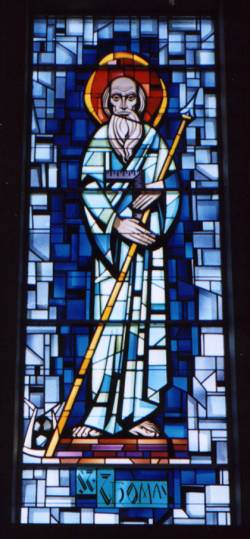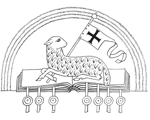
Part One: The Apostles’ Creed
7.
“
From Thence He Shall Come to Judge the Living and the Dead”
 There is only one final judge of the human race. It is God
by whom the world was first created and to whom we are destined in eternity to
return. What may be less obvious is that this same Almighty God became man in
the person of Christ. Consequently, Jesus Christ has the divine right to judge
all mankind.
There is only one final judge of the human race. It is God
by whom the world was first created and to whom we are destined in eternity to
return. What may be less obvious is that this same Almighty God became man in
the person of Christ. Consequently, Jesus Christ has the divine right to judge
all mankind.
Immediately we distinguish between the Lord judging us individually at the moment of death, and judging us as the human family at the end of the world. We call the first judgment particular and the second general. They are not the same.
Particular JudgmentThe individual judgment of each person at death will be made by Jesus Christ. As understood by the Church, right after death the eternal destiny of each separate soul is decided by the just judgment of God. Those leaving the body in the state of grace, but in need of purification, are cleansed in purgatory. Souls that are perfectly pure are at once admitted to the beatific vision of the Holy Trinity. Those who depart in actual mortal sin are at once sent to eternal punishment, whose intensity depends on the gravity of their sin. The biblical evidence for the particular judgment is mainly indirect. While no single passage in the Bible explicitly affirms this dogma, there are several that teach an immediate retribution after death. Therefore the particular judgment is clearly implied in Sacred Scripture. Thus Christ represents Lazarus and the rich man (Dives) as receiving their respective reward and punishment immediately after death. To the penitent thief on Calvary, Jesus promised that his soul, instantly on leaving the body, would be in the state of the blessed: “This day, you will be with me in Paradise” (Luke 23:43). St. Paul longs to be absent from the body that he may be present with the Lord, clearly understanding death to be the entrance into his reward (Philippians 1:21-23). The Old Testament speaks of a retribution at the hour of death (Ecclesiasticus 11:28-29). This is also the understanding of the great Fathers of the Church, like St. Augustine and St. Ephraem. They spoke of two “second comings of Christ.” The first is when we die, and the second on the last day of the whole human race. As the earliest acts of the martyrs and liturgies reveal, the martyrs were persuaded of the prompt reward of their loyalty to Christ. This belief is shown in the ancient practice of honoring and invoking the saints, even those who were not martyrs. The Church’s practice of canonizing the saints simply confirms the traditional belief that we shall all be judged on our final destiny the moment we leave time and enter eternity.
General JudgmentFew truths are more frequently or more clearly proclaimed in the Scriptures than the fact of a general judgment. The Old Testament prophets refer to this judgment in speaking of “The Day of the Lord” (Joel 2:31; Isaiah 2:12), when all nations will be summoned to be judged by the Lord of all. In the New Testament, the Second Coming (Parousia) of Christ as Judge of the World is woven into the whole mystery of salvation. The Lord’s prediction of the Last Day covers the whole twenty-fifth chapter of the Gospel of St. Matthew as an appropriate introduction to the long narrative of Christ’s Passion in Chapter twenty-six. Story of the Two Parables. Chapter twenty-five opens with two parables about the five foolish and the five wise virgins, and about the master who goes on a journey and leaves three of his servants with varying amounts of money to put to good use in his absence. In the first parable, the five foolish virgins fail to bring enough oil for their lamps to meet the bridegroom (Christ). By the time they reach the marriage feast “the door was shut.” The bridegroom tells them, “I do not know you.” Then Christ’s warning to all of us: “Watch, therefore, because you know not the day nor the hour” (Matthew 25:1-13). In the second parable, when the master (Christ) returns from his journey he demands an account of his servants. The servants who received five and two talents respectively wisely put their talents to good use and earned another five and two talents each as a result. They were both praised by the master and handsomely rewarded. But the man who had been given only one talent buried it and apologized for his neglect. He was cast out into the exterior darkness. There shall be weeping and gnashing of teeth. Prediction of the Last Day. Anticipating His prophecy of the general judgment, Christ foretold the destruction of Jerusalem (Matthew 24:1-51). The logic of His prediction is clear. Since no less than Jerusalem itself was actually destroyed as Christ had predicted, so the final judgment of mankind will certainly take place. What is most instructive is the detail of Christ’s teaching about who and how the world will be judged: “When the Son of Man shall come in His majesty, and all the angels with Him, then shall He sit upon the seat of His majesty.” Who shall be judged? “All nations shall be gathered together before Him. And He shall separate them one from another, as the shepherd separates the sheep from the goats. And He shall set the sheep on His right hand, but the goats on His left.” How shall we be judged? On the basis of our practice of selfless charity: Then shall the King say to them on His right hand, “Come, blessed of my Father, possess the Kingdom prepared for you from the foundation of the world. For I was hungry and you gave me to eat. I was thirsty, and you gave me to drink. I was a stranger and you took me in; naked, and you covered me; sick, and you visited me. I was in prison and you came to me” (Matthew 25:34-36). The saved will then ask Christ when did they minister to His needs, and He will tell them, “As long as you did it to one of these, my least brethren, you did it to me.” Then will follow the same dialogue with those who are lost. They will be told, “Depart from me you cursed, into everlasting fire which was prepared for the devil and his angels.” They will be condemned on the same grounds as the first will be saved. “As long as you did it not to one of these least, neither did you do it to me.” The prophecy of the general judgment closes with one of the single most important verses in the bible. Christ foretells that those who failed in charity “shall go into everlasting punishment,” but those who had selflessly met the needs of others, “the just,” shall go “into life everlasting” (Matthew 25:31-46). He uses the same identical word, “everlasting,” in Greek aionios, to describe the endless pains of hell as well as the endless joys of heaven. 
Copyright © 2002 Inter Mirifica
Pocket Catholic Catechism |